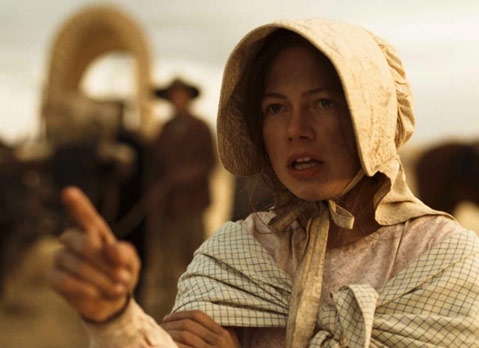Meek’s Cutoff
Michelle Williams, Bruce Greenwood, and Shirley Henderson star in a film written by Jonathan Raymond and directed by Kelly Reichardt.

With the slow but steady-going, strangely hypnotic minimalist frontier saga Meek’s Cutoff, writer/director Kelly Reichardt scores another one in a small but highly distinctive filmography. She’s three for three in the past five years, following the Zen-slacker classic Old Joy and the dog-loving jagged-edge jewel Wendy and Lucy. These films, all based on stories and/or scripts by Jon Raymond, are unique unto their own various style and content but heed a recognizable sense of artistic voice. They’re minimalist movies that assiduously avoid the clichés of Hollywood or Indiewood, take their time, but seize our attention in a refreshing way.
Part frontier dirge, part existential allegory, and part Reichardtian artistic challenge to herself, Meek’s Cutoff follows the plight of a compact wagon train of mid-18th-century settlers who have been led astray by the grizzled, possibly huckster guide Meek (Bruce Greenwood). Now, they are seeking not so much a place to settle as basic water. They are, alas, lost in the West. (The film was all shot—and with a patient, sentient beauty, by cinematographer Chris Blauvelt—in the forbidding but lovely terrain of the Oregon high desert, Reichardt’s beloved home turf.)
Michelle Williams, so memorable as the protagonist in Wendy and Lucy, is the voice of greatest potential reason and insight amid an inherently uncertain situation, who establishes a subtle connection with an Indian guide (Rod Rondeaux, who impresses mightily in his virtually dialogue-free role) enlisted in the process of leading them to water. The parties in the group are torn whether to trust “the Indian” or Meek, who warns them about the native interloper’s goal: “It could be water. Could be an army of heathens.”
Driving the narrative turbine, albeit in a necessarily low gear, are questions of trust and destiny, and “correct” answers are never forthcoming—as in life. Even Jeff Grace’s musical score, a sparse and poetic grid of ethereal swaths and swipes, is an implicit illustration of this disarmingly moving small film’s atmosphere, about the suspension of belief and rationality. Sometimes, ambiguity is its own reward.



